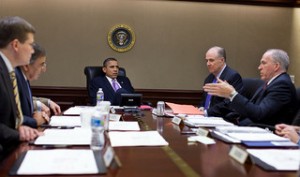If 40 Months of Drone Strikes in Yemen Haven’t Made Transfers Safe …
When on January 5, 2010 President Obama announced a halt to all transfers of Yemeni Gitmo detainees, he reiterated his intent to close the prison, even noting that AQAP formed, in part, in response to Gitmo (recall that Said al-Shihri, one of AQAP’s actual operational leaders, had been a Gitmo detainee).
Finally, some have suggested that the events on Christmas Day should cause us to revisit the decision to close the prison at Guantanamo Bay. So let me be clear. It was always our intent to transfer detainees to other countries only under conditions that provide assurances that our security is being protected.
With respect to Yemen in particular, there’s an ongoing security situation which we have been confronting for some time, along with our Yemeni partner. Given the unsettled situation, I’ve spoken to the Attorney General and we’ve agreed that we will not be transferring additional detainees back to Yemen at this time.
But make no mistake: We will close Guantanamo prison, which has damaged our national security interests and become a tremendous recruiting tool for al Qaeda. In fact, that was an explicit rationale for the formation of al Qaeda in the Arabian Peninsula.
The announcement came less than a week after John McCain, Lindsey Graham, and Joe Lieberman released a statement (citing Shihri explicitly) complaining about the imminent release of 6 Yemeni detainees; Dianne Feinstein and Kit Bond issued their own request. Jane Harman and Crazy Pete Hoekstra were also calling for a halt to transfers to Yemen (Hoekstra, of course, was also leaking NSA intercepts to fearmonger against Anwar al-Awlaki). The day after the announcement, DOD sources leaked a report that would later be released in more detail showing 20% of Gitmo detainees released had joined or rejoined al Qaeda. In short, in significant part it came in response to political pressure to halt transfers, something DiFi admits readily.
But the halt in transfers also came among Obama Administration guarantees that their new strategy against Yemen would quickly bring results. Brennan described the new security agreements put into place at the January 2, 2010 David Petraeus-Ali Abudullah Saleh meeting (this is where Brennan estimated the number of AQAP militants to be “several hundred”) at which Saleh agreed to let fixed wing planes, including drones, operate in his country.
WALLACE: Let me widen this discussion in that sense. Not only as you point out, obviously, were you in Yemen earlier, but General Petraeus, the head of Central Command, was in Yemen yesterday.
The British overnight have announced that the U.S. and the British are going to be co-funding a new Yemeni anti-terror counter-terror police force.
Is it fair to say that we are opening up a second front in our war on terror outside the Afghanistan-Pakistan theater in Yemen?
BRENNAN: I wouldn’t say we’re opening up a second front. This is the continuation of an effort that we’ve had under way since, as I said, the beginning of this administration.
David Petraeus has been out to Yemen several times. I spoke with him yesterday after he met with President Salih. We’re continuing to have a very close and ongoing dialogue with the Yemeni government. The cooperation is on the security, intelligence and military fronts.
We’ve had close consultations with the British. I spoke with the British last night also about the types of things that we can do together in support of the Yemeni government. So this is a determined and concerted effort.
We’re not going to let Al Qaeda continue to sort of make gains in Yemen, because we need to take whatever steps necessary to protect our citizens there as well as abroad.
WALLACE: Could that mean U.S. troops on ground in Yemen?
BRENNAN: We’re not talking about that at this point at all. The Yemeni government has demonstrated their willingness to take the fight to Al Qaeda. We — they’re willing to accept our support. We’re providing them everything that they’ve asked for.
And they’ve made some real progress. And over the past month, Al Qaeda has taken a number of hits, and a number of Al Qaeda leaders in Yemen are no longer with us because of this determined and aggressive action.
The day after Obama announced the moratorium on Yemen transfers, Robert Gibbs claimed (perhaps because several Yemenis had been transferred in December) that the moratorium came as a result of a recent decline in security.
MR. GIBBS: I have not seen or heard about the latest report that you refer to and I don’t have handy what numbers had been for similar reports in years past. Yesterday’s determination was made and announced very much on what you heard John Brennan say over the weekend. We never had a plan to transfer anybody either to their home country or to a third country that we believe — we have reason to believe will present a security situation for us or for that country. And in relating to Yemen, I think you heard John say nobody was going to be transferred back that we did not believe that the Yemeni government could handle.
The determination was made that given the — as you heard the President say — the swift change in the security environment even over the last few weeks in Yemen caused the President and the Attorney General to agree that pausing any of those transfers was the right policy right now.


